MercoPress. South Atlantic News Agency
Tag: Joaquim Levy
-
Monday, June 17th 2019 - 09:00 UTC
Head of Brazil's powerful Development bank resigns following clash with Bolsonaro
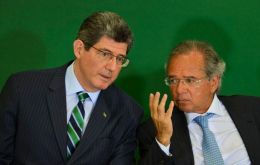
The head of Brazilian state development bank BNDES has submitted a letter of resignation amid public tensions with president Jair Bolsonaro, reflecting the serious divisions that continue to plague the administration’s upper echelons.
-
Friday, December 21st 2018 - 12:01 UTC
Brazil’s development bank “must return” to the Treasury some US$ 25bn
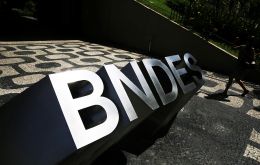
Brazil’s future economy minister wants state development bank BNDES to return 100 billion Reais, some US$25.7 billion, to the nation’s treasury in 2019, a newspaper reported, as the incoming government seeks to cut the nation’s hefty debt load.
-
Tuesday, November 13th 2018 - 10:42 UTC
Bolsonaro's economic team incorporates another Chicago orthodox liberal
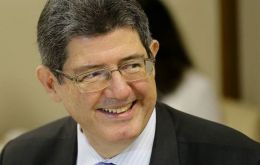
Joaquim Levy, managing director and World Bank chief financial officer, has been tapped to be the next president of Brazil’s national economic and social development bank BNDES, news advanced to a column in daily O Estado de S. Paulo published on Sunday.
-
Thursday, January 28th 2016 - 06:49 UTC
Brazil expected to announce massive injection of loans to revive the economy
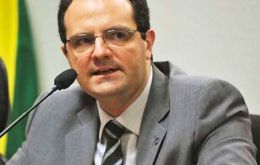
Brazil’s Finance Minister Nelson Barbosa is expected to announce as much as 60bn Reais (US$15bn) in loans as the government seeks to revive growth amid the worst economic downturn in over a century.
-
Wednesday, December 23rd 2015 - 10:07 UTC
Brazil's Barbosa insists fiscal policies to shrink budget deficit “will be maintained”

Brazil’s new finance minister, Nelson Barbosa, continued his effort to win over investors on Tuesday reiterating that the government of president Dilma Rousseff will maintain the same fiscal policies intended to shrink the budget deficit and cut debt that were favored by his predecessor.
-
Tuesday, December 22nd 2015 - 14:49 UTC
Brazil's new minister promises the same Levy targets, but fails to convince investors

Brazil's new finance minister sought to reassure investors on Monday as he took the reins of the recession-hit economy, but the Sao Paulo stock market and the Brazilian real both fell. In his first full business day on the job, Finance Minister Nelson Barbosa held a teleconference with international investors, promising to practice the same fiscal discipline as his predecessor, Joaquim Levy.
-
Saturday, December 19th 2015 - 06:39 UTC
Rousseff picks Barbosa as finance minister, a strong critic of Levy and austerity

Brazilian President Dilma Rousseff on Friday picked her close aide Nelson Barbosa, a left-leaning economist, to take over the finance ministry from Joaquim Levy who is leaving after a series of disagreements over economic policy.
-
Friday, December 18th 2015 - 08:01 UTC
Brazil's budget targets ignored by Congress; Finance minister could resign
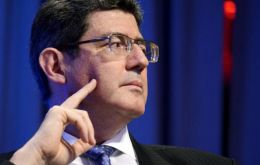
Brazil’s Congress on Thursday approved a 2016 budget with surplus targets lower than what Finance Minister Joaquim Levy wanted, a day after the country lost an investment-grade credit rating on concerns about fiscal restraint.
-
Friday, November 27th 2015 - 07:55 UTC
Brazilian banks follow closely events in Argentina: Dollar at 12 Pesos

Brazilian banks which follow closely events in Argentina and prospects of the new government under president Mauricio Macri, believe the official exchange rate of 9.67 Pesos to the dollar will inevitably have to be devalued, to 12 Pesos by the end of the year, which means a 24% depreciation.
-
Thursday, November 19th 2015 - 07:49 UTC
Rousseff's just manages to uphold vetoes on spending bills; greater challenge in the pipeline
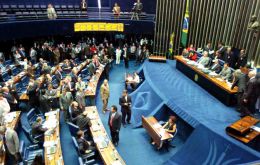
Brazil's Congress has upheld President Dilma Rousseff's vetoes of two bills to raise public spending, a victory for the embattled leader as she tries to close a gaping fiscal deficit and regain investors' confidence.
